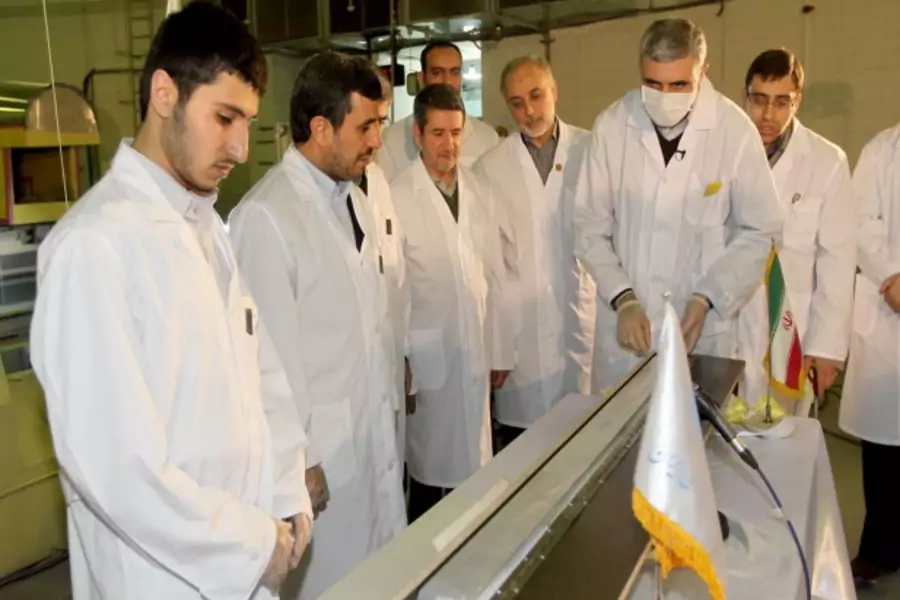Iran, the Bomb, and U.S. Public Opinion

More on:
The Obama administration hoped the specter of an oil embargo and increasingly stringent banking sanctions would finally force Iran to come clean on its clandestine nuclear program and end its enrichment activities. No such luck. After the third round of P5+1 negotiations in Moscow ended last month in a stalemate, the White House and Congress are competing to isolate the intransigent Iranian government.
Last Thursday, the U.S. Treasury Department moved to close holes in the Iran sanctions regime, blacklisting more than a dozen front companies and four individuals that are helping Tehran evade U.S. and European Union (EU) restrictions on its oil exports, and placing twenty Iranian financial institutions on a watch list.
Meanwhile on Capitol Hill, Congress is pushing for tougher measures aimed at crippling the Iranian economy, arguing that current U.S. efforts are falling short. Taking matters into their own hands, a bipartisan group of legislators began crafting legislation to impede Iranian companies from buying insurance, exporting goods, and securing foreign financial assistance. “What we’ve done so far has been good, but it is clearly not enough,” concludes Howard Berman, ranking Democrat on the House Foreign Affairs Committee. “The pressure has to intensify.”
At the same time, outside groups such as the hawkish Foreign Policy Initiative are ratcheting up calls for preemptive military strikes on Iranian nuclear facilities. In a recent piece, Jamie Fly and William Kristol advocate for Congress to pass an Authorization for Use of Military Force (AUMF) against Iran to lend credibility to the U.S. threat of direct action.
Amidst the heightened cacophony of policymakers and pundits, there remains strong public support in the United States—and in many countries abroad—for sanctions, but widespread opposition to the use of military force. A new analysis of U.S. and global opinion on nuclear proliferation, produced by the Council on Foreign Relations and the Program on International Policy Attitudes (PIPA), reveals some insights on the most imminent threat to international peace and security.
- Americans are deeply concerned about Iranian acquisition of the bomb. An overwhelming majority of U.S. citizens believe that Iran is pursuing nuclear weapons and poses a serious threat to U.S. national security. They doubt that a nuclear-armed Iran could be deterred from attacking Israel by the prospect of nuclear retaliation—in other words, they do not believe that Tehran can be expected to behave rationally. Such anxieties are also shared among European publics, albeit by smaller majorities. Surprisingly, levels of concern about an Iranian nuclear weapon vary across the Muslim world. In Iran’s regional rival, Saudi Arabia, 45 percent of respondents consider the prospect of an Iranian bomb to be a negative development, compared to 70 percent in Jordan.
- Americans favor sanctions over military force by wide margins. When presented with a menu of five policy options to deal with Iran’s nuclear program in 2011, one third of U.S. respondents favored imposing sanctions to stop Iran from producing nuclear fuel, whereas only 13 percent endorsed military action. A slim 8 percent of respondents were willing to accept a nuclear Iran.
- American support for military force rises if depicted as a last resort. In 2011, the German Marshall Fund (GMF) presented U.S. and European citizens with two options: take “military action against Iran” or “simply accept that Iran could acquire nuclear weapons.” Faced with this scenario, 49 percent of Americans and 42 percent of Europeans favored the use of military force. (This question assumed, somewhat problematically, that military force would necessarily achieve the goal of dismantling the Iranian nuclear program.)
- A majority of Americans support engagement with Iran. By a wide margin, U.S. citizens in a November 2011 poll agreed that “Iran is a threat that can be handled with diplomacy now” (55 percent), rather than with immediate military action (15 percent). Reluctance to contemplate military options may reflect public pessimism about its likely consequences. A 2010 survey by Chicago Council on Global Affairs survey found that four-fifths of Americans believed that military strikes alone would fail to stop Iran’s nuclear program. Huge majorities also thought attacks would increase support for the Iranian regime and potentially lead to retaliatory strikes against U.S. regional allies and the U.S. homeland.
- Most Americans do not favor an Israeli strike. If support is low for U.S. military action, should the Israelis take care of the problem instead? In a poll released in March 2012, 24 percent of Americans advocated an Israeli strike, while 69 percent favored the continued pursuit of negotiations with Iran by the United States and other major powers. Only 14 percent believed the U.S. government should encourage an Israeli attack on Iranian nuclear facilities; instead, 80 percent believed the United States should either remain neutral (46 percent) or actively discourage (34 percent) such a unilateral attack. (To be sure, the desire to remain “neutral” could encompass a range of motivations—including a desire to have Israel do the dirty work, without embroiling the United States).
- Three quarters of Americans prefer that the United States deal with the Iranian nuclear issue through the UN Security Council. In a March 2012 poll by the Sadat Chair/PIPA, 74 percent of U.S. respondents preferred the UN Security Council to lead the charge against Iran, whereas only 20 percent thought the United States should act primarily by itself.
- Americans can envision a nuclear deal with Iran. Under Article 6 of the Nuclear Nonproliferation Treaty, all countries possess the right to peaceful nuclear energy. Given the proliferation risks and Iran’s of reneging on international agreements, many U.S. officials and experts argue that Iran should only be allowed to import fuel from abroad, rather than produce domestically. American citizens, however, support the idea of allowing Iran to produce nuclear fuel on the condition that the regime accepts intrusive UN inspections.
More on:
 Online Store
Online Store